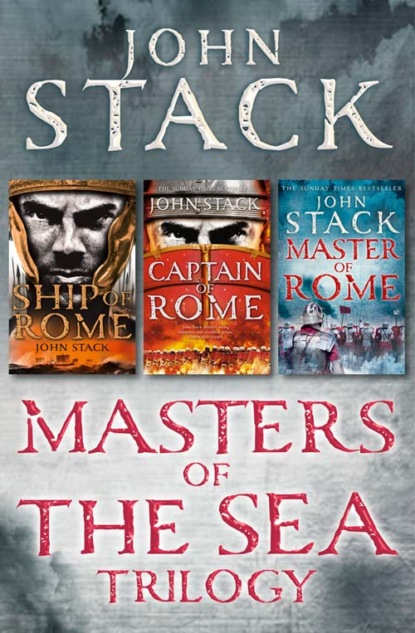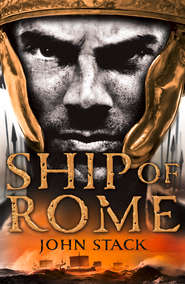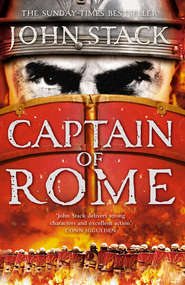По всем вопросам обращайтесь на: info@litportal.ru
(©) 2003-2025.
✖
Masters of the Sea Trilogy: Ship of Rome, Captain of Rome, Master of Rome
Автор
Год написания книги
2019
Настройки чтения
Размер шрифта
Высота строк
Поля
‘Very well,’ Septimus said suddenly. ‘You’re dismissed,’ he added, realizing that it would be best not to send the guard back to Scipio with a black eye.
The praetorian saluted again and remounted his horse. He wheeled around and galloped off.
‘Domitian!’
‘Yes, Septimus,’ the foreman replied as he stepped out from inside the main door from where he had witnessed the exchange.
‘Order my personal aide to lay out my kit and have one of the stable lads ready a mount.’
Domitian acknowledged the command and was gone. Septimus strode to the main gate and watched the messenger weave his way through the throng of people on the street. He turned and entered the house and within minutes re-emerged in full dress uniform. He mounted the horse held by the stable lad and cantered out through the main gate.
Atticus approached the town house of the senior consul slowly, the winding streets keeping his mount down to a trot. He had followed the praetorian messenger from Ostia, relying on the guard to guide him to the city and to the senator’s house within. Atticus was a creature of the wide open expanses of the sea; whereas he could plot any course on the featureless water using the sun and stars, his sense of direction failed him completely in the enclosed streets of Rome. As he turned into the walled courtyard of Scipio’s town house he saw Septimus standing near the entranceway into the atrium beyond.
‘About time,’ Septimus called up. ‘I’ve had to wait here until you arrived.’
Atticus nodded a smile, knowing that the centurion was probably burning with the same curiosity as he was.
‘Any idea why we’ve been called now?’ he asked as he dismounted beside Septimus.
‘No. I only know from the news I heard on the street when I passed through the Forum Magnum that the Senate has approved the building of a fleet and both Scipio and Duilius will command it.’
‘Duilius?’ Atticus asked as both men passed under the entrance into the serenity of the atrium.
‘This year’s junior consul. Owns half of the land straddling the city and stocks most of the markets from his fields.’
Atticus nodded, realizing that he knew very little about the most important citizens of the city and the main players in the Senate.
The praetorian guard commander was waiting for them inside.
‘Come with me,’ he ordered brusquely, although his rank was no higher than the captain or centurion’s.
‘Friendly as ever,’ Septimus murmured.
The commander led them through a series of rooms, some obviously for entertaining guests and dining, and others that seemed to serve no visible purpose other than to display the artwork and statues adorning the space. The house was expansive, the simple courtyard and atrium deceptively small given the depth of the house. They came upon Scipio under the shade of an awning in an inner courtyard. He was sitting alone, apparently deep in thought. He did not look up as the three men entered.
The guard commander peeled off and the men of the Aquila approached alone.
‘Captain Perennis and Centurion Capito reporting as ordered,’ Atticus announced as both men snapped to attention.
‘Ah yes,’ Scipio said, looking up as if noticing them for the first time.
‘The Senate has decided to build a fleet of one hundred and fifty triremes. You are to report to Publius Cornelius Lentulus, the master shipbuilder in Ostia, and assist him in this task, specifically to relate to him your experience of the enemy and their capabilities.’
‘Yes, Consul,’ both men replied.
They waited for a further command but none was forthcoming. Scipio looked back down at his notes, seeming to forget the two officers. A full minute passed.
‘You’re dismissed!’ the senior consul finally said, and Atticus and Septimus turned on their heels and left.
The two men retraced their steps through the house back to the main courtyard where a stable lad held the reins of their horses.
‘By the gods, Septimus …’ Atticus breathed, his face a mask of astonishment. ‘One hundred and fifty galleys. It’s a mammoth task. It’ll take six months at least and then they’ll have to find men to crew them all.’
‘Atticus, Atticus …’ Septimus chided with a smile, amused by his friend’s astonishment. ‘Look around you, man. Look at the city that has been built here. Built by Scipio and others like him in the Senate. If they have decided that one hundred and fifty galleys are to be built, then built they shall be – and not within six months either. They know the threat is more imminent and the ships will be needed sooner. I’ll bet the deadline is half that time and the crews are already being levied as we speak.’
Atticus shook his head, disbelieving. Surely the Senate had set too big a task for Rome to complete.
Septimus looked up at the sun. It was an hour after midday.
‘We still have time to meet this master shipbuilder today,’ he said as he mounted. Atticus nodded and mounted his own horse, wheeling it around to follow Septimus out through the main gate. In his mind’s eye he tried to picture such a massive armada. He could not. His logical mind told him it wasn’t possible in the time they had. In six months the campaign season would be over and Sicily would be strewn with the starved bodies of the Second and Ninth legions. At best they had three months to break the blockade.
Septimus’s words echoed in his ears as he rode back towards the Forum Magnum and his eyes were drawn up to the magnificent buildings that surrounded the central plaza. They were truly the work of great men; determined men who set themselves a task and followed through regardless of the cost or consequences. Perhaps his friend was right; perhaps the Senate had set Rome the task knowing she could respond in kind. As his mind debated the mission ahead he subconsciously spurred his horse to a greater speed; his innate impatience to get started drove him on and he brushed past Septimus to take the lead. By the time they cleared the Porta Flumentana on the road to Ostia, their horses were galloping at full tilt.
‘Here they come again!’
Marcus Fabius Buteo spun around in the direction of the shouted warning in time to see yet another cavalry charge from the woods to the left of the marching column.
‘Form up!’ the centurion roared, and ran to position himself at the head of the lead transport wagon, the maniple’s signifer running behind him, the standard becoming the pivot point of the formation.
As Marcus ran, a Roman cavalry unit tore through a gap in the supply train, the riders’ heads low in an attempt to gain every ounce of speed from their mounts. The Carthaginian cavalry were over three hundred yards away. At full gallop they would cover the distance in less than twenty seconds. The Roman cavalry had to engage them fast and as far away from the valuable supplies as they could and so they rode like men possessed, the seemingly endless attacks pumping adrenaline through their veins to overcome the fatigue in both horse and rider.
‘Stand the line!’ Marcus shouted as the maniple formed around him. Every soldier heard the command and braced himself forward against the coming onslaught. The command meant no fall-back, no reserve rally point. There would be no further order to manoeuvre and they would fight where they stood, each man knowing the reason. They could not leave the supplies undefended.
The attacks had begun five days ago, before the legions had even crossed the territorial dividing line. The first surprise strike had been the most devastating. Although the maniples guarding the supplies, including the IV of the Ninth commanded by Marcus, reacted instantly to the cavalry charge, they were no match for the swift and manoeuvrable mounted enemy. Without the support of their own cavalry units, who were dispersed along the entire length of the three-mile-long marching column, the infantry soldiers could do little but hold their ground and defend themselves. It was at the point of impact in that first attack that Marcus realized the true target of the enemy. While small detachments peeled off the main cavalry charge to keep the infantry tied down, they made no attempt to push home their attack or penetrate the defensive shield walls of the legionaries. Instead their focus had been the supply wagons. Dozens of fire arrows had been loosed into the heaped wagons while spearmen targeted the tethered oxen. The result had been catastrophic. The Carthaginians had disengaged after only five frenzied minutes, leaving the supply train in chaos. Marcus, like the other centurions, had ordered the men to douse the flames while frantic appeals for support were sent up the line to the legion commanders. That first attack had cost them a tenth of their entire supplies.
The legions had camped that first night on the very spot of the attack, the engineers hastily erecting the protective palisade of a marching legion in enemy territory. The attack had been dissected in detail, the legions’ commanders quizzing the centurions who had witnessed the coordinated ambush. Changes were made. Defences were strengthened. Counter measures were deployed, including cavalry and a fire guard with responsibility for protecting the combustible supplies.
The ambushes had reached their peak on the third day when a combined force of enemy infantry and cavalry attacked at a river ford. The Romans had been quick to respond and the enemy had been severely bruised and routed, their foolhardy infantry suffering the most against the determined legionaries. The Carthaginians had switched back to exclusively mounted attacks after the minor setback and so now, on the fifth day, an hour after midday, Marcus and his men were forced to respond to yet another strike, the fourth that day.
From one hundred and fifty yards away, Marcus heard the crunch of steel, bone, man and horse as the two cavalry forces collided. The collision was vicious, the naked belligerence of both sides turning the fight into brutal combat where no quarter was asked or given. The men of the IV maniple could only watch in silence, their teeth bared in hatred at the enemy out of their reach. All eyes were on the chaotic mêlée.
‘On the flank!’
Marcus saw the danger immediately as he reacted to the cry. Another enemy cavalry unit of fifty mounted men had broken from the cover of the woods and were bearing directly down on his maniple’s position, bypassing the engaged Roman cavalry, heading straight for the supply train. The order went out for the Roman reserve cavalry to counter this second thrust, but Marcus knew they would not arrive in time, positioned as they were at the very rear of the supply train.
‘Charge weapons,’ the centurion shouted, and the men of his maniple roared a defiant primal scream as they thrust out their pila between their shields, presenting a wall of deadly steel to the approaching horsemen. The oxen behind the men bellowed in terror at the confused scene around them, the sound mixing with the war cries of the fast-approaching Punici. Marcus leaned forward into his shield and braced his left foot behind, steadying himself against the wave of man and beast approaching at the terrifying speed of thirty miles per hour. The ground beneath him trembled with the force of the charge.
‘Hastati!’ he shouted, the enemy now one hundred yards away.
‘Loose!’
The whooshing sound of forty pila released together filled the air above the shield wall as the hastati of the IV put their might behind the throw of their javelins, their craving to bring death to the enemy fuelling their effort. The javelins seemed to hang in the air for a heartbeat before falling into the oncoming charge. Man and horse buckled and fell under the deadly shower but the charge was barely checked and the Carthaginians came on over their fallen comrades with renewed hatred and drive.
‘Steady, boys!’ Marcus shouted, his men taking strength from the calmness of the command.
The cavalry charge turned at the last possible second, sweeping down the line of the shield wall, the deadly points of the bared pila forcing the turn. The Carthaginians hurled both fire arrows and spears into the supplies behind the wall of legionaries, striking blow after deadly blow against the precious supplies. One rider was slow to turn and his mount crashed straight into the braced, interlocked shields at the head of the maniple. The one-thousand-pound horse tore through the wall, catapulting two soldiers into the oxen and wagons behind, killing them instantly. The horse slammed directly against the six-foot-high wagon wheel with a sickening crunch. The Carthaginian rider was thrown and landed deep within the ranks of the legionaries where he was instantly dispatched under the blows of half a dozen blades.
As the last of the riders swept past Marcus, the centurion ordered a second volley of pila, this time into the undefended rear of the charge. Again the missiles had a deadly effect on their targets but again the charge did not waver. As the Carthaginians exhausted all their arrows and spears they peeled off and began their retreat to the woods, the lead rider sounding a horn that signalled to the Carthaginian cavalry engaged with the Romans that it should break off and retreat. Within an instant the field before the defending Romans was clear once again. The attack had lasted no more than four minutes.









